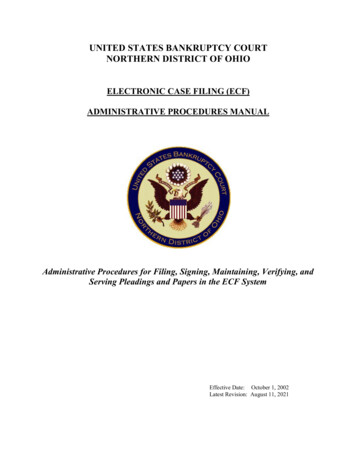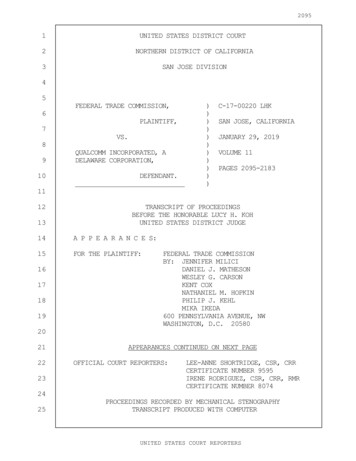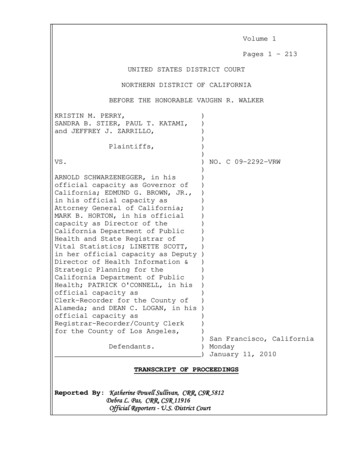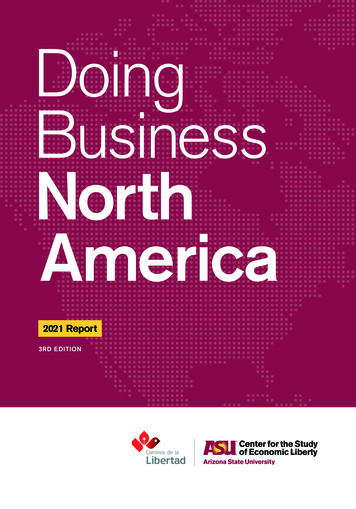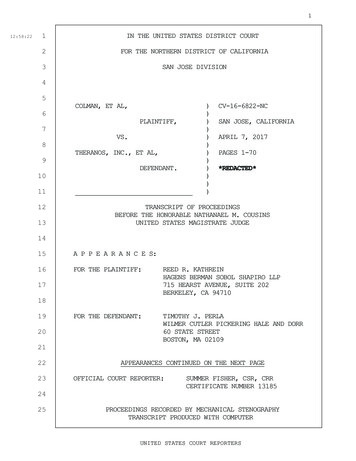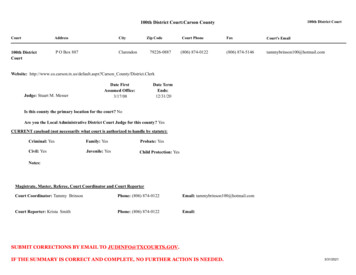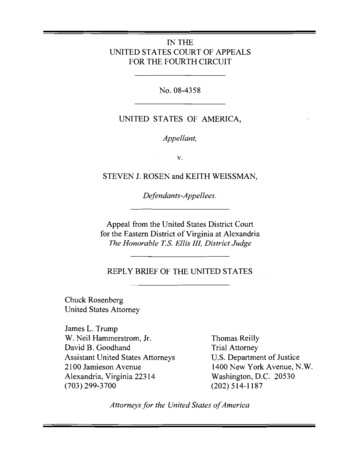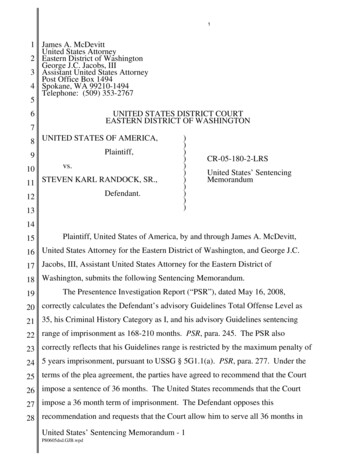
Transcription
Styczinski et al v. ArnoldDoc. 38CASE 0:20-cv-02019-NEB-BRT Doc. 38 Filed 07/23/21 Page 1 of 33UNITED STATES DISTRICT COURTDISTRICT OF MINNESOTATHOMAS JOHN STYCZINSKI; TOM“THE COIN GUY”, LLC; DEFENSE,Plaintiffs,Case No. 20‐CV‐2019 (NEB/BRT)ORDER ON MOTION FOR SUMMARYJUDGMENT AND MOTION TODISMISSv.GRACE ARNOLD, in her capacity asCommissioneroftheMinnesotaDepartment of Commerce,Defendant.Several coin dealers and an association of coin dealers1 (collectively, the “CoinDealers”) sued Grace Arnold, the Commissioner of the Minnesota Department ingbulliondealersisunconstitutional or preempted by federal law. The Coin Dealers moved for summaryjudgment, and Commissioner Arnold moved to dismiss. For the reasons below, the Courtgrants and denies both motions in part.The plaintiffs are Thomas John Styczinski; Tom “The Coin Guy”, LLC; Treasure IslandCoins, Inc.; and Numismatist United Legal Defense.1Dockets.Justia.com
CASE 0:20-cv-02019-NEB-BRT Doc. 38 Filed 07/23/21 Page 2 of 33BACKGROUNDThis lawsuit challenges the Minnesota statute regulating “bullion productdealers,” a classification that generally includes coin dealers.2 The statute imposes certainrequirements and prohibitions on bullion product dealers and their representatives. SeeMinn. Stat. §§ 80G.01–.11. The plaintiff Coin Dealers challenge the constitutionality of thelaw, and the dispute centers around the definition of “dealer” and the requirementsimposed upon dealers by the law. These requirements apply only to those who meetdealer status under the law.The definition of dealer is, at a minimum, less than straightforward. To begin,under the statute a “dealer” is a person or entity “who buys, sells, solicits, or marketsbullion products or investments in bullion products to consumers” and who satisfies oneof three requirements: (1) being “incorporated, registered, domiciled, or otherwiselocated in” Minnesota; (2) having a “dealer representative”3 in Minnesota; or (3) who“does business with a consumer at a location in this state, or delivers or ships a bullionproduct or makes a payment to a consumer at an address in this state, unless theA “bullion product” is “any coin, round, bar, or ingot containing silver, gold, platinum,palladium, or other precious metal.” Minn. Stat. § 80G.01, subdiv. 2.2A “dealer representative” is a person who acts as “an employee, contractor, or agent ofa dealer and who “interact[s] with consumers for the purpose of the buying, selling,solicitation, or marketing of bullion products or investments in bullion products.” Minn.Stat. § 80G.01, subdiv. 4.32
CASE 0:20-cv-02019-NEB-BRT Doc. 38 Filed 07/23/21 Page 3 of 33transaction occurs when the consumer is at a business location outside of this state.” Id.§ 80G.01, subdiv. 3(a).It gets more complex from there. Even if a person or entity meets the abovedefinition under subdivision 3(a), they may still be exempted from dealer status undersubdivision 3(b). Examples include wholesalers, those who sell exclusively at garage orestate sales, securities brokers, auctioneers, people who only sell at twelve or fewerMinnesota trade shows per year, and banks and other financial institutions. Id. § 80G.01,subdiv. 3(b).The next step is determining what obligation the law imposes upon dealers. If aperson or entity meets the definition of dealer, does not qualify for exemptions, andtransacts 25,000 or more in bullion products in a year, they must register with thecommissioner of commerce and pay a 25 registration fee. Id. § 80G.02, subdivs. 1, 5.Conducting business after failing to register is a misdemeanor. Id. § 80G.08. Additionally,a dealer must maintain a surety bond in an amount determined by its transactions withMinnesota consumers in the twelve‐month period prior to registration or renewal.4 Id.§ 80G.06, subdiv. 1.At the time this suit was filed, and until after the hearing on the parties’ motions, adealer only needed to maintain a surety bond if its sales in the previous twelve monthswere 25,000 or greater. Minn. Stat. § 80G.06 (2016). In addition, the surety bond sectioncontained no language geographically limiting the transactions that counted toward thesurety bond threshold. See id. While the motions were under advisement, the MinnesotaLegislature amended the surety bond portion of the bullion dealer law. (ECF Nos. 36,36‐1 at 20.) Now, only transactions with Minnesota consumers count toward the surety43
CASE 0:20-cv-02019-NEB-BRT Doc. 38 Filed 07/23/21 Page 4 of 33And, in addition to the registration and bond requirements, the bullion dealer lawregulates a dealer’s sales practices. Among other things, a dealer must: provide aconsumer with an invoice, investigate any consumer complaints, deliver bullion productsto the consumer in the agreed‐upon timeframe, refrain from misrepresenting anymaterial aspect of a bullion product, and stop calling a consumer after the consumerrequests not to be contacted. Id. § 80G.07, subdiv. 1. The commissioner of commerce hasauthority to enforce the bullion dealer law, and Commissioner Arnold has used thisauthority. Id. § 80G.10, subdivs. 1–2; (ECF No. 1 (“Compl.”) ¶¶ 28, 31–35.)The Coin Dealers bringing this lawsuit would like to transact in bullion productswithout registering or posting a bond, and so they challenge the legality of the bulliondealer law. (Compl. ¶¶ 40–44.) First, they claim that the bullion dealer law violates theDormant Commerce Clause in three ways: it excessively burdens interstate commerce, itdiscriminates against out‐of‐state commerce, and it regulates conducts outside ofMinnesota. (Id. ¶¶ 45–123.) Second, they claim that the bullion dealer law violates theFourteenth Amendment because it is impermissibly vague. (Id. ¶¶ 124–44.) Third, theCoin Dealers claim that the bullion dealer law is preempted because it conflicts withfederal laws and policies related to coins issued by the United States Mint and IndividualRetirement Accounts (“IRAs”). (Id. ¶¶ 145–86.) Both parties filed a dispositive motion:bond threshold, and dealers must maintain a surety bond even if they sold less than 25,000 worth of bullion products in the past year. Minn. Stat. § 80G.06 (2021).4
CASE 0:20-cv-02019-NEB-BRT Doc. 38 Filed 07/23/21 Page 5 of 33the Coin Dealers for summary judgment and Commissioner Arnold to dismiss for failureto state a claim and, for the Coin Dealers’ IRA preemption claim, for lack of subject matterjurisdiction. (ECF Nos. 19, 26.)ANALYSISThe Court must grant the Coin Dealers’ summary judgment motion if they show“that there is no genuine dispute as to any material fact and the[y are] entitled tojudgment as a matter of law.” Fed. R. Civ. P. 56(a). Neither party disputes any materialfacts, making this a purely legal issue. As for Commissioner Arnold’s motion to dismiss,the Court accepts the facts as alleged in the Coin Dealers’ Complaint and asks onlywhether the facts they pled would entitle the Coin Dealers to relief. Bell Atl. Corp. v.Twombly, 550 U.S. 544, 570 (2007); see also Cnty. of St. Charles v. Mo. Fam. Health Council,107 F.3d 682, 684–85 (8th Cir. 1997) (affirming the district court’s grant of a motion todismiss on a matter of statutory interpretation).I.Dormant Commerce ClauseThe Coin Dealers’ first three challenges to the law are under the DormantCommerce Clause. The Commerce Clause grants Congress the power to “regulateCommerce . . . among the several States.” U.S. Const. art. I, § 8, cl. 3. The negativeimplication of this power, the Dormant Commerce Clause, is that states may not enactlaws that “unduly restrict interstate commerce.” Tenn. Wine & Spirits Retailers Ass’n v.Thomas, 139 S. Ct. 2449, 2459 (2019). The Coin Dealers claim that the bullion dealer law5
CASE 0:20-cv-02019-NEB-BRT Doc. 38 Filed 07/23/21 Page 6 of 33violates the Dormant Commerce Clause in three ways: it unduly burdens interstatecommerce, it discriminates against out‐of‐state commerce, and it is impermissiblyextraterritorial in its scope. (Compl. ¶¶ 45–123; ECF No. 21 at 16–30; ECF No. 31 at 2–20.)A. Statutory InterpretationThe parties’ Dormant Commerce Clause arguments depend on the scope of thebullion dealer law. (E.g., ECF No. 29 at 6–8; ECF No. 31 at 4–7.) Determining the scope ofthe law is crucial to these claims because the parties’ contrasting interpretations impactthe degree to which the law burdens interstate commerce. Most notably, the Coin Dealersclaim that purely out‐of‐state transactions count toward the 25,000 threshold thattriggers the registration requirement; Commissioner Arnold argues that they do not.Thus, the Court must engage in statutory interpretation.The parties have not cited, and the Court cannot find, any Minnesota SupremeCourt case interpreting the bullion dealer law.5 Because the Minnesota Supreme Courthas not interpreted the bullion dealer law, the Court must “‘predict, as best [it] can, how[the Minnesota Supreme Court] would decide the issue’” of the law’s scope. QwestComms. Co., LLC v. Free Conferencing Corp., 905 F.3d 1068, 1074 (8th Cir. 2018) (internalquotation and citation omitted); see also Progressive N. Ins. Co. v. McDonough, 608 F.3d 388,390 (8th Cir. 2010) (noting that a federal court is “bound by decisions of the highest statecourt when interpreting state law”).5Or, for that matter, any Minnesota Court of Appeals case interpreting the law.6
CASE 0:20-cv-02019-NEB-BRT Doc. 38 Filed 07/23/21 Page 7 of 33When interpreting a statute, the Minnesota Supreme Court first asks whether thestatute is ambiguous on its face. Wilbur v. State Farm Mut. Auto. Ins. Co., 892 N.W.2d 521,523 (Minn. 2017) (citation omitted). A statute is ambiguous only when “the languagetherein is subject to more than one reasonable interpretation.” Id. (citation omitted). If thestatute is not ambiguous, the Court stops there. Roberts v. State, 933 N.W.2d 418, 423(Minn. Ct. App. 2019) (citing State v. Peck, 773 N.W.2d 768, 772 (Minn. 2009)).As noted above, the critical issue in this case is determining which transactionscount toward the 25,000 threshold that triggers the registration requirement. The plainlanguage of Section 80G.02 unambiguously counts out‐of‐state transactions toward thisthreshold, especially in light of the amendments made to the law.6 There is no support inthe text of the statute for Commissioner Arnold’s argument to the contrary, and when thetext of the statute is unambiguous, the Court cannot read words into the statute that arenot in the text. In re Matter of Dahlgren Twp., 906 N.W.2d 512, 518 (Minn. Ct. App. 2017)(citing Reiter v. Kiffmeyer, 721 N.W.2d 908, 911 (Minn. 2006)). The registration requirementcounts transactions “in the aggregate” and lacks a geographic limit regarding whichtransactions count. Minn. Stat. § 80G.02, subdiv. 1. Nor is the definition of “dealer”geographically limited. Id. § 80G.01, subdiv. 3. Aside from the surety bond requirement,The Minnesota legislature, by amending the surety bond section of the law to includeonly transactions with Minnesota consumers, showed that it is able to geographicallylimit transactions that count toward a threshold when it so wishes. Minn. Stat. § 80G.06(2021). The legislature did not add such a limit to the registration requirement in Section80G.02.67
CASE 0:20-cv-02019-NEB-BRT Doc. 38 Filed 07/23/21 Page 8 of 33the law does not state that only transactions in Minnesota count, and the Court cannotread that limitation into the law. See Premier Bank v. Becker Dev., LLC, 785 N.W.2d 753, 760(Minn. 2010) (explaining that under the Minnesota Supreme Court’s rules of statutoryconstruction, a court cannot add words or meaning to a statute when the legislature hasomitted or overlooked them).An example illustrates: an Iowa coin dealer sells 25,000 worth of bullion productsin Iowa and a single coin for one dollar in Minnesota. That coin dealer is a “dealer” underthe statute because she sold bullion products to a consumer in Minnesota.7 Minn. Stat.§ 80G.01, subdiv. 3(a)(3). And she would have to register because she sold 25,001 worthof bullion products “in the aggregate”—under the plain language of the statute, it doesnot matter where those aggregate sales took place, just that they summed to 25,000. Id.§ 80G.02.Similarly, Minnesota coin dealers would be required to register even if they onlytransacted bullion products out of state. Take a hypothetical Minnesota coin dealer whotraveled to a trade show in Wisconsin and sold a bullion product worth 25,000. That coindealer is a dealer under the statute, because she sold a bullion product and is domiciledThis hypothetical assumes that the coin dealer does not qualify for any of the Section80G.01, subdivision 3(b) exceptions.78
CASE 0:20-cv-02019-NEB-BRT Doc. 38 Filed 07/23/21 Page 9 of 33in Minnesota.8 Id. § 80G.01, subdiv. 3(a)(1). She would have to register because she sold 25,000 or more in bullion products. Id. § 80G.02.This reading is supported by the Eighth Circuit’s decision in Olson v. Push, Inc.,640 F. App’x 567 (8th Cir. 2016). In Olson, the Eighth Circuit, applying Minnesota rules ofstatutory interpretation, interpreted the Minnesota Drug and Alcohol Testing in theWorkplace Act’s (“DATWA”) definition of “employer.” Id. at 569–70. The statute definedan “employer” as “a person or entity located or doing business in [Minnesota] and havingone or more employees.” Id. at 569 (citing Minn. Stat. § 181.950, subdiv. 7). The partiesdisagreed whether “employer” covered the out‐of‐state employees of an entity that doesbusiness in Minnesota. The Eighth Circuit interpreted the statute broadly, reasoning thatDATWA contained no limiting language restricting its applicability to only Minnesota‐based employees. Id. at 569–70. As in Olson, the bullion dealer law contains no limitinglanguage suggesting that only Minnesota sales count toward the 25,000 registrationthreshold.In sum, the registration requirement contains no geographic limiting language,and the Court cannot read into the statute a modification that is not there. See DahlgrenTwp., 906 N.W.2d at 518 (citation omitted); Roberts, 933 N.W.2d at 423 (explaining thatwhen a statute is clear on its face, a court considers no other factors) (citation omitted).Again assuming that the coin dealer does not qualify for any of the subdivision 3(b)exceptions.89
CASE 0:20-cv-02019-NEB-BRT Doc. 38 Filed 07/23/21 Page 10 of 33The Court analyzes the Coin Dealers’ Dormant Commerce Clause claims under thisinterpretation of the law.B. Discrimination Against Out‐of‐State CommerceThe Coin Dealers claim that the bullion dealer law unconstitutionallydiscriminates against out‐of‐state trade shows. Because the Coin Dealers are claiminginjury to entities other than themselves, the Court must first assess whether they havestanding to bring such a challenge. See Raines v. Byrd, 521 U.S. 811, 819 (1997).1. StandingA plaintiff must establish standing to bring each claim, including an injury‐in‐fact.9Town of Chester v. Laroe Ests., Inc., 137 S. Ct. 1645, 1650 (2017); Susan B. Anthony List v.Driehaus, 573 U.S. 149, 157–58 (2014) (explaining that a plaintiff must establish theelements of standing for each claim). Among other things, the injury must beparticularized and specific to the plaintiff, ensuring that the plaintiff has a “personalstake” in the outcome. Raines, 521 U.S. at 819 (emphasizing the personal nature of theinjury requirement) (citations omitted). In the Commerce Clause context, plaintiffs canestablish injury by showing that a law’s alleged discrimination against some other out‐of‐state entity financially harms them. See S.D. Farm Bureau, Inc. v. Hazeltine, 340 F.3d 583,592 (8th Cir. 2003) (holding that companies that lost business as a result of a law thatAside from the Coin Dealers’ IRA preemption claim, discussed below, there is nochallenge to the Coin Dealers’ standing to bring their other claims, and the Courtconcludes that the Coin Dealers have standing for those claims.910
CASE 0:20-cv-02019-NEB-BRT Doc. 38 Filed 07/23/21 Page 11 of 33discriminated against out‐of‐state entities had standing, even though the law did notdiscriminate against the plaintiffs); Gen. Motors Corp. v. Tracy, 519 U.S. 278, 286–87 (1997)(concluding that a car manufacturer, against whom the statute at issue did notdiscriminate, had standing to bring a Dormant Commerce Clause challenge because thediscrimination would force it to pay more for an input purchased from out‐of‐state).Additionally, a plaintiff has standing when violating the allegedly discriminatory lawwould subject the plaintiff to a credible threat of enforcement. Alexis Bailly Vineyard, Inc.v. Harrington, 931 F.3d 774, 778 (8th Cir. 2019) (holding that a vineyard had standing tochallenge a law that discriminated against out‐of‐state ingredient suppliers when thevineyard intended to purchase from an out‐of‐state supplier and faced a credible threatof prosecution if it bought ingredients from those suppliers).Some of the Coin Dealers have established that they face injury resulting from thebullion dealer law’s discrimination against out‐of‐state trade shows. First, the CoinDealers have standing because they face a credible threat of enforcement if they engagein conduct that the allegedly discriminatory law curtails. Under the law, the Coin Dealerscannot sell at an out‐of‐state trade show without losing eligibility for an exception todealer status. Thus, if they sell at an out‐of‐state trade show and are ineligible for theother exceptions, they must register.10 As the Coin Dealers have alleged, if they continue10Assuming they meet the 25,000 registration threshold.11
CASE 0:20-cv-02019-NEB-BRT Doc. 38 Filed 07/23/21 Page 12 of 33to do business without registering, they face a threat of enforcement, so they havestanding. (Compl. ¶¶ 28–39); Alexis Bailly, 931 F.3d at 778.Second, as in Hazeltine, some of the Coin Dealers have standing because they facefinancial harm from the discrimination. Styczinski and other plaintiffs11 would like toparticipate in out‐of‐state trade shows without having to register. (Compl. ¶¶ 40(e), 43(f).)Under subdivision 3(b)(5), Styczinski is not considered a dealer if he engages in no morethan twelve in‐state trade shows. Minn. Stat. § 80G.01, subd. 3(b)(5). But if he participatesin a single out‐of‐state trade show, he becomes ineligible for the subdivision 3(b)(5)exception. The same is not true if he participates in a single in‐state trade show. By beingunable to participate in out‐of‐state trade shows without losing eligibility for thesubdivision 3(b)(5) exception, Styczinski (and others like him) are forced to forgoPlaintiffs include an organizational plaintiff, the Numismatist United Legal Defensefund. An organization has standing to sue when (1) its members would have standing;(2) the suit is relevant to the organization’s purpose; and (3) individual members’participation in the suit is unnecessary. Owner‐Operator Indep. Drivers Ass’n, Inc. v. U.S.Dep’t of Transp., 831 F.3d 961, 967 (8th Cir. 2016) (citation omitted). Members of theNumismatist United Legal Defense would have standing because they wish to participatein out‐of‐state trade shows without having to register. (Compl. ¶ 43.) This suit isconsistent with the purpose of the Numismatist United Legal Defense fund, which is to“protect [coin dealers’ and coin collectors’] legal rights to collect and deal in coins.” (Id.¶ 5.) Finally, the Court sees no reason why the individual members of the NumismatistUnited Legal Defense would have to participate in this suit. Thus, the organization hasstanding.1112
CASE 0:20-cv-02019-NEB-BRT Doc. 38 Filed 07/23/21 Page 13 of 33potential sales at out‐of‐state trade shows, decreasing their potential sales and thuscausing them financial harm.122. MeritsA state law that discriminates against interstate commerce is generally invalid.LSP Transmission Holdings, LLC v. Sieben, 954 F.3d 1018, 1026 (8th Cir. 2020) (citationomitted). There are three ways in which a law might discriminate: on its face, in itspurpose, or through its effects. Id. (citation omitted). A law discriminates againstinterstate commerce when it provides for “differential treatment of in‐state and out‐of‐state economic interests that benefits the former and burdens the latter.” Alexis Bailly, 931F.3d at 778 (quoting Or. Waste Sys., Inc. v. Dep’t of Env’t Quality, 511 U.S. 93, 99 (1994)).The magnitude of the discrimination is irrelevant—even marginal discrimination violatesthe Dormant Commerce Clause. Associated Indus. of Mo. v. Lohman, 511 U.S. 641, 650 (1994)(citations omitted). If the law is discriminatory, Commissioner Arnold must show, under“‘rigorous scrutiny’” that the law “serves some legitimate purpose unrelated to limitinginterstate commerce and that the [law] is the only possible way to achieve this purpose.”U & I Sanitation v. City of Columbus, 205 F.3d 1063, 1067–68 (8th Cir. 2000) (citationsomitted).Plaintiff Treasure Island Coins, Inc. is not similarly situated. It has not alleged that itwishes to participate in out‐of‐state trade shows without registering, so the Court cannotconclude that it faces a threat of financial harm. Thus, it lacks standing to bring a DormantCommerce Clause discrimination claim under the theory of financial harm.1213
CASE 0:20-cv-02019-NEB-BRT Doc. 38 Filed 07/23/21 Page 14 of 33The bullion dealer law discriminates against out‐of‐state trade shows on its faceand through its effects. The law allows coin dealers to sell at up to twelve in‐state tradeshows per year without registering,13 but it does not afford the same privilege to thoseselling at out‐of‐state trade shows. This differential treatment makes in‐state trade showsmore attractive than out‐of‐state shows. All else equal, a bullion dealer would prefer totake part in a Minnesota trade show, and thus retain eligibility for a dealer statusexemption, than an out‐of‐state trade show which would automatically cause them toforfeit eligibility for that exemption. In other words, the bullion dealer law impermissiblybenefits in‐state commerce and burdens out‐of‐state commerce. LSP Transmission, 954F.3d at 1026.The next question, then, is whether Minnesota has another way to advance thelegitimate interest served by this law. U & I Sanitation, 205 F.3d at 1068. The law serves toregulate bullion dealers and protect the public from unscrupulous business practices inbullion transactions. Representative Hilstrom, Statement on HF157, (May 15, 2013), at39:33–40:02, https://www.house.leg.state.mn.us/hjvid/88/880378 [hereinafter Statement onHF157] (explaining that the bill is designed to protect the public, and specifically seniors,from fraudulent and unscrupulous coin dealers). But excepting Minnesota‐trade‐show‐only dealers does not serve this purpose. The law would serve the state’s purposes justAssuming the coin dealer does not transact in coins anywhere other than the in‐statetrade shows.1314
CASE 0:20-cv-02019-NEB-BRT Doc. 38 Filed 07/23/21 Page 15 of 33as well, if not better, without the subdivision 3(b)(5) exception. More bullion dealerswould then be covered by the law, expanding its protections. Exempting participants atin‐state trade shows from dealer status is not necessary to protect the public fromunsavory business practices in bullion transactions. Because the in‐state trade showexception discriminates against out‐of‐state commerce and is not the only way to advancethe state’s interest, it is unconstitutional.3. RemedyIn Minnesota,14 a statute is generally severable. Minn. Stat. § 645.20. A statute isonly non‐severable if: (1) the statute includes a provision saying it is not severable; (2) thevalid and the void portions of the statute are so interconnected and dependent on eachother that the legislature would not have enacted the statute in its severed form; or (3) thevalid provisions, by themselves, are “incomplete and are incapable of being executed inaccordance with the legislative intent.” Id. None of these three apply. Chapter 80G has nonon‐severability provision, and the Court cannot conclude that the in‐state trade showexception of subdivision 3(b)(5) is so interconnected with the rest of the bullion dealerlaw that the legislature would not have enacted it in its severed form. Finally, the bulliondealer law is not incomplete without this provision. The registration and bondrequirements of Sections 80G.02 and 80G.06 still apply, and even without the in‐stateThe severability of a state statute is a matter of state law. Leavitt v. Jane L., 518 U.S. 137,139 (1996).1415
CASE 0:20-cv-02019-NEB-BRT Doc. 38 Filed 07/23/21 Page 16 of 33trade show exception, the bullion dealer law is still capable of protecting the public fromunsavory bullion dealers.The Court must next determine how much of subdivision 3(b)(5) to sever. Whensevering a part of a statute, the Court must “attempt to effectuate the intent of thelegislature had it known that a provision of the law was invalid.” State v. Melchert‐Dinkel,844 N.W.2d 13, 24 (Minn. 2014) (internal quotation and citation omitted). Additionally,and perhaps obviously, the Court should sever as little of the statute as possible. Back v.State, 902 N.W.2d 23, 31 (Minn. 2017) (citations omitted). The smallest portion the Courtcould sever to render the statute constitutional is to strike “in this state” from subdivision3(b)(5). With those three words stricken, the bullion dealer law no longer favors in‐statetrade shows over their out‐of‐state counterparts. Without these words, the law still servesthe legislature’s intent—to protect the public from unscrupulous bullion dealers.Melchert‐Dinkel, 844 N.W.2d at 24. Thus, the Court severs “in this state” from subdivision3(b)(5).C. Undue BurdenEven after finding unconstitutionality on the grounds of discrimination againstout‐of‐state commerce, the Court must still analyze the Coin Dealers’ next challenge—that the law places an undue burden on interstate commerce. LSP Transmission, 954 F.3dat 1030–31. The Court concludes that it does not. Undue burden claims are evaluatedunder the Pike balancing test, under which a court balances the “legitimate local public16
CASE 0:20-cv-02019-NEB-BRT Doc. 38 Filed 07/23/21 Page 17 of 33interest against [the law’s] incidental burden on interstate commerce.” Id. at 1030 (citationomitted). A law is invalid if “the burden imposed on such commerce is clearly excessivein relation to the putative local benefits.” Id. (quoting Pike v. Bruce Church, Inc., 397 U.S.137, 142 (1970)). When assessing the burden a statute imposes, a court is not limited toconsidering the effects on the parties before it, but should “adopt an aggregate analysiswhereby [the court] consider[s] the interstate effect on the . . . market if severaljurisdictions were to adopt similar [statutes].” U & I Sanitation, 205 F.3d at 1069.The bullion dealer law’s impact on interstate commerce is minimal. Registering,paying a 25 fee, and obtaining a surety bond are the only things standing between coindealers wishing to sell bullion product in Minnesota and being able to do so lawfully. SeeAm. Target Advert., Inc. v. Giani, 199 F.3d 1241, 1254 (10th Cir. 2000) (concluding thatrequirements that firms register with the state and pay a 250 application fee wereminimal burdens on interstate commerce). Although some out‐of‐state bullion dealersmay determine that the benefits of doing business in Minnesota do not outweigh the costsof complying with the requirements, these minimal requirements do not seriouslyimpede interstate commerce. The Dormant Commerce Clause, after all, “protects theinterstate market, not particular interstate firms, from prohibitive or burdensomeregulations.” Exxon Corp. v. Governor of Md., 437 U.S. 117, 127–28 (1978); see also Pharm.Care Mgmt. Ass’n v. Rowe, 429 F.3d 294, 313 (1st Cir. 2005) (citation omitted) (explainingthat a law does not burden interstate commerce when the only burden is an impact on a17
CASE 0:20-cv-02019-NEB-BRT Doc. 38 Filed 07/23/21 Page 18 of 33firm’s profits). Additionally, the aggregate effect on interstate commerce would benegligible even if several other states adopted similar bullion dealer laws. See U & ISanitation, 205 F.3d at 1069. Though there may be more friction in the bullion productsmarket if this were the case, nothing in these laws would prohibit the interstate sale ofbullion products. Instead, bullion dealers would just have to register in several states.Even if the bullion dealer law somewhat burdens interstate commerce, the law’sconsumer protection benefits greatly exceed those burdens. The law was enacted inresponse to a wave of fraudulent practices in the bullion market, including fraudulentsolicitation targeting the elderly. Statement on HF157 at 39:33–40:02 (explaining that thebill is designed to protect the public, and specifically seniors, from fraudulent andunscrupulous coin dealers). Minnesota has an interest in stemming such fraudulentactivity. See Am. Target, 199 F.3d at 1254 (holding that the state had a legitimate publicinterest in preventing fraud and noting that “[i]n its legitimate campaign againstfraudulent solicitations, the state would be severely hampered if allowed only to regulatein‐state solicitors”); Ford Motor Co. v. Tex. Dep’t of Transp., 264 F.3d 493, 503 (5th Cir. 2001)(concluding that preventing fraud and “other abuses of [] citizens” were legitimate publicinterests) (citation omitted).D. ExtraterritorialityThe Coin Dealers’ next challenge to the law is that it regulates wholly out‐of‐statecommerce. The Court agrees that part of the law—Section 80G.07—does, and that this18
CASE 0:20-cv-02019-NEB-BRT Doc. 38 Filed 07/23/21 Page 19 of 33section is therefore unconstitutional on this ground. “The Commerce Clause precludesapplication of a state statute to commerce that takes place wholly outside of the stateʹsborders.” Cotto Waxo Co. v. Williams, 46 F.3d 790, 793 (8th Cir. 1995) (citin
Several coin dealers and an association of coin dealers1 (collectively, the "Coin Dealers") sued Grace Arnold, the Commissioner of the Minnesota Department of Commerce, alleging that Minnesota's statute regulating bullion dealers is unconstitutional or preempted by federal law.

